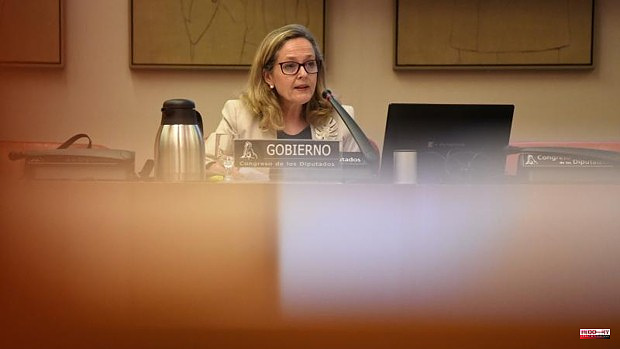The First Vice President of the Government and Minister of Economic Affairs, Nadia Calviño, has taken advantage of her appearance this Thursday in the Joint Commission for the European Union of Congress to defend the measures approved by the Government to cushion the impact of inflation after the cataract of criticism that has rained down on him from the OECD, the World Bank, the European Commission, the Bank of Spain or the Independent Authority for Fiscal Responsibility.
With half the world asking the Executive to rethink the general discount of 20 cents per liter of fuel or the reduction from 21 to 10% of the VAT rate applicable to electricity bills and introduce a more selective approach to limit aid to groups vulnerable and to prevent its application from becoming a problem for public accounts, Calviño has guaranteed its extension beyond June 30 and has defended its effectiveness, assuring that without these measures, inflation would be between two and three percentage points above its current level, that is, between 10.5% and 11.5%.
“Thanks to the strong measures adopted in response to the war, inflation has been reduced between two and three percentage points in the course of this year. Our intention is to extend the measures that have been put in place that are being very effective in containing the rise in prices“, assured the vice president, in response to criticism made in recent weeks, who questioned their effectiveness when it comes to lower inflation and even branded them as regressive for benefiting higher incomes more than lower ones.
Criticism of its fiscal policy measures and the trickle of downward revisions to Spain's growth forecasts for both this year and the next, of which the latest and most severe example was that of the OECD this past Wednesday, they have not eroded their optimistic view of the economic situation. He maintains that the growth above 4% given to Spain by all the analysis institutes translates into strong and better growth compared to that of other large European economies, which is also going to be compatible with an improvement in the fiscal situation and raises the labor market data to illustrate the wisdom of the government's reforms.
Calviño appeared this Thursday afternoon in Congress with the latest data on the daily affiliation of workers to Social Security, according to which there are already 20,345,245 affiliations in the registry - the vice president has spoken of affiliates, but the registry The Social Security Department does not count people but affiliation records and there are some workers who are registered more than once - and it has underlined that this figure represents half a million more affiliations than before the pandemic. She has also highlighted, as usual, the increase in permanent contracts, which for her represents an improvement in the quality of employment.
But the vice president actually appeared in Congress to report on the deployment of the Recovery Plan, another "weak" flank of the Government's action, which is affected by the low execution of the plan and its limited impact on the real economy. None of this is true for the Minister of Economic Affairs.
Calviño said yesterday that the growth in employment and the positive evolution of investment cannot be explained if it is not for European funds and gave as an example the announcements of openings of mega-factories for electric batteries in Valencia or Extremadura, even with the resources of the Perte of the unassigned electric vehicle, or the announcements of large investments by other multinationals such as Intel in Spain.
It has also pulled data to disprove the low execution data. He has advanced that at the end of May the Government has already authorized 42% of the credits planned for this year, has committed 30% and has recognized obligations equivalent to 11% of the total, which in his opinion are very positive data. The translation is as follows. At the end of April, the Government has unblocked 42% of the budget items assigned to European funds, has mobilized calls that reach 30% of the funds and has only effectively allocated 11% of the funds, when practically reached the halfway point of the year. At this rate, at the end of the year, only less than 30% of the European funds planned for this year will have been effectively allocated.







